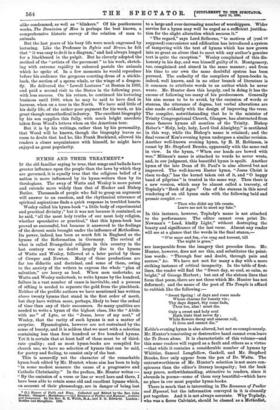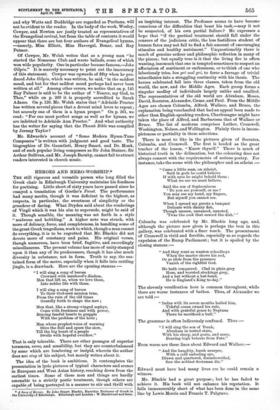HYMNS AND THEIR TREATMENT.* IF the old familiar saying be
true, that songs and ballads have greater influence upon the people than the laws by which they are governed, it is equally true that the religious belief of a nation is more influenced by its hymn-writers than by its theologians. The sway of Watts and Wesley is more potent and extends more widely than that of Hooker and Bishop Butler. Thousands of people who fail to grasp an argument will answer to an emotion, and the rhythmical utterance of spiritual aspirations finds a quick response in troubled hearts.
Wesley called his hymn-book "a little body of experimental and practical divinity ;" but it was not because it contained, as he said, "all the most holy truths of our most holy religion, whether speculative or practical," that this hymn-book has proved so successful, but because it answered to the feelings of the devout souls brought under the influence of Methodism. Its power, indeed, has been as much felt in England as the hymns of the Reformation in Germany. The revival of what is called Evangelical religion in this country in the last century was no doubt largely due to the hymns of Watts and Wesley, followed at a later period by those of Cowper and Newton. Many of these productions are far too didactic and doctrinal, and some of them, owing to the anxiety of the writers to express the whole "plan of salvation," are heavy as lead. When men undertake, as Watts and Wesley undertook, to write hymns by the hundred, failure in a vast number of cases is inevitable, and a process of sifting is needed to separate the gold from the pinchbeck. Neither of the prolific authors we have mentioned has written above twenty hymns that stand in the first order of merit, but they have written more, perhaps, likely to bear the ordeal of time than any of their successors. So many qualities are needed to write a hymn of the highest class, like the "Abide with me" of Lyte, or the "Jesus, lover of my soul," of Wesley, that the rarity of such hymns is not a matter of surprise. Hymnologists, however are not restrained by the sense of beauty, and it is seldom that we meet with a selection containing less than four hundred or five hundred hymns. Yet it is certain that at least half of these must be of third- rate quality ; and as most hymn-books are compiled for church use, we have no selection of hymns that can be said, for poetry and feeling, to consist only of the best.
This is assuredly not the character of the remarkable hymn-book edited by Mr. Hunter, whose aim has been to help "in some modest measure the cause of a progressive and Catholic Christianity." In the preface, Mr. Hunter writes :— "By the omission of a verse or line or word here and there, I have been able to retain some old and excellent hymns which, on account of their phraseology, are in danger of being lost
• (1.) Hymns of Faith and Hops. Collected and Edited by the Rev. John Hunter. Glasgow: Maclehose.—(2.) Romance of Psalter and Hynanat : Authors and Composers. By the Rev. R. E. Welsh, M.A., and F. G. Edwards. London : Hodder and Stoughton. 1889.
to a large and ever-increasing number of worshippers. Wider service for a hymn may well be urged as a sufficient justifica- tion for the slight alteration which secures it."
"The regard," says Lord Selborne, "to motives of (real or supposed) convenience and edification has introduced a system of tampering with the text of hymns which has now grown
into so great an abuse that to meet with any author's genuine text is quite the exception." Wesley complained of this dis- honesty in his day, and was himself guilty of it. Montgomery, too, complained and sinned in the same manner ; and from
his time to our own the same doubtful system has been pursued. The audacity of the compilers of hymn-books is, indeed, well known, and in no other branch of literature is it common to attribute words to an author which he never wrote. Mr. Hunter does this largely, and in doing it has the excuse of following too many of his predecessors. Generally his aim seems to be to avoid, by the omission of words or stanzas, the utterance of dogma, but verbal alterations are also made evidently with the design of improving the verse. The compiler, notwithstanding that he is the minister of Trinity Congregational Church, Glasgow, has abstracted from some famous hymns all mention of the Trinity. Bishop
Heber's "Holy, holy, holy, Lord God Almighty," is mutilated in this way, while the Bishop's name is retained; and the final verse of Ken's evening hymn undergoes a similar revision. Another well-known evening hymn, by R. H. Robinson, is recast by Mr. Stopford Brooke, apparently with the same end in view. In the hymn, "When our heads are bowed with woe," Milman's name is attached to words he never wrote,
and, in our judgment, this beautiful hymn is spoilt. Another hymn of the late Dean of St. Paul's is also altered but not improved. The well-known Easter hymn, "Jesus Christ is risen to-day," has the kernel taken out of it, and "0 happy band of pilgrims" is treated in the same way. Then there is a new version, which may be almost called a travesty, of Toplady's "Rook of Ages." One of the stanzas in this novel rendering of an old hymn ends with the following bald and prosaic couplet :—
"Thou who didst my life create, Leave me not to meet my fate."
In this instance, however, Toplady's name is not attached to the performance. The editor cannot even print Dr. Newman's "Lead, kindly Light," without destroying the beauty and significance of the last verse. Almost any reader will see at a glance that the words in the final stanza,— " O'er moor and fen, o'er crag and torrent, till The night is gone,"
are inseparable from the imagery that precedes them. Mr. Hunter, however, does not see this, and substitutes the point- less words : "Through fear and doubt, through pain and sorrow," &c. We have not met for many a day with a more striking instance of critical incapacity. In the table of first. lines, the reader will find the "Sweet day, so cool, so calm, so bright," of George Herbert ; but out of the sixteen lines that form that poem, there are not three which Mr. Hunter has not deformed ; and the name of the poet of The Temple is affixed to rubbish like the following :—
" Sweet Spring ! of days and roses made Whose charms for beauty vie ; Thy days depart, thy roses fade, Thou too, alas ! must die.
Only a sweet and holy soul Hath tints that never fly ;
While flowers decay and seasons roll,
It lives and cannot die."
Keble's evening hymn is also altered, but not so conspicuously. Mr. Hunter's renovating or destructive hand cannot even leave the Te Deum alone. It is characteristic of this volume—and this some readers will regard as a fault and others as a virtue —that while it contains a considerable number of hymns by Whittier, Samuel Longfellow, Gaskell, and Mr. Stopford Brooke, four only appear from the pen of Dr. Watts. The untrustworthiness of Mr. Hunter's selection is not more con- spicuous than the editor's literary incapacity; but the book may prove, nothwithstanding, attractive to readers, since it abounds in poems—some of them very beautiful—which have no place in our most popular hymn-books.
There is much that is interesting in The Romance of Psalter and Hymnal, but the information conveyed in it is clumsily put together. And it is not always accurate. Why Toplady, who was a fierce Calvinist, should be classed as a Methodist,
and why Watts and Doddridge are regarded as Puritans, will not be evident to the reader. In the body of the work, Wesley, Cowper, and Newton are justly treated as representatives of the Evangelical revival, but from the table of contents it would appear that there are but four authors of Evangelical hymns, —namely, Miss Elliott, Miss Havergal, Bonar, and Ray Palmer.
Of Cowper, Mr. Welsh writes that as a young man "he started the Nonsense Club and wrote ballads, some of which won wide popularity. One in particular became famous,—John Gilpin." It is scarcely necessary to point out the inaccuracy of this statement. Cowper was upwards of fifty when he pro- duced John Gilpin, which was written, he said, "in the saddest mood, and but for that saddest mood perhaps had never been written at all." Among other errors, we notice that on p. 145 Ray Palmer is said to be the author of "Nearer, my God, to Thee," while on p. 269 it is properly accredited to Sarah Adams. On p. 126, Mr. Welsh states that "Adelaide Procter has written several pieces that a devout mind loves to repeat; but scarcely one of them is a hymn proper." On p. 261, we read: "For our most perfect songs as well as for hymns, we are indebted to Adelaide Ann Procter." And what authority has the writer for saying that the Thumb Bible was compiled by Jeremy Taylor?
Mr. Edwards's account of "Some Modern Hymn-Tune Composers" is written with judgment and good taste. The biographies of Dr. Ganntlett, Henry Smart, and Dr. Monk, and of such popular living composers as Sir John Stainer, Sir Arthur Sullivan, and Mr. Joseph Barnby, cannot fail to attract readers interested in church music.



















































 Previous page
Previous page